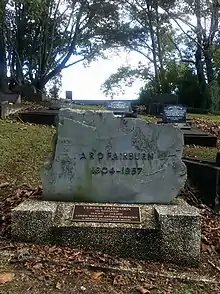A. R. D. Fairburn
Arthur Rex Dugard Fairburn (2 February 1904 – 25 March 1957), commonly known by his initials A. R. D. Fairburn and otherwise as Rex, was a New Zealand poet who was born and died in Auckland.
A. R. D. Fairburn | |
|---|---|
| Born | Arthur Rex Dugard Fairburn 2 February 1904 |
| Died | 25 March 1957 (aged 53) Auckland, New Zealand |
| Nationality | New Zealander |
| Other names | "Rex" Fairburn |
| Occupation | Poet |

Fairburn was born in Auckland in 1904. His grandfather, the surveyor, thinker and traveller Edwin Fairburn, was one of the first Pākehā born in New Zealand in 1827. His great-grandfather, William Thomas Fairburn, had come to New Zealand as a missionary for the New Zealand Church Missionary Society in 1819.[1][2]
Fairburn attended Auckland Grammar School, where he first met R. A. K. Mason, and worked at various jobs, including relief work on the roads. Later he tutored in English and lectured on the history and theory of Art at Elam School of Art, Auckland University College. His poetry was initially influenced by the (then unfashionable) Georgian poets.[1]
Works
- He Shall Not Rise [1930]
- Dominion (1938)
- Poems 1929–41
- Walking on My Feet (1945)
- Strange Rendezview (1952)
- Three Poems including Dominion, The Voyage, To a Friend in the Wilderness (1952)
- plus satirical and light verse including:
- The Sky is a Limpet (A Polytickle Parrotty)
- How to Ride a Bicycle (In Seventeen Lovely Colours)
- The Rakehelly Man
- Poetry Harbinger
"Reverie on the Rat" "Rhyme of the Dead Self"
References
- Trussell, Denys. "Fairburn, Arthur Rex Dugard". Dictionary of New Zealand Biography. Ministry for Culture and Heritage. Retrieved 15 December 2021.
- Scholefield, Guy, ed. (1940). A Dictionary of New Zealand Biography : A–L (PDF). Vol. I. Wellington: Department of Internal Affairs. p. 238.
External links
- Biography in the 1966 Encyclopaedia of New Zealand
- Interview with A.R.D Fairburn's daughters Dinah Holman and Janis Fairburn about their father for Cultural Icons project. Audio.
- Poems in Kowhai Gold (1930)